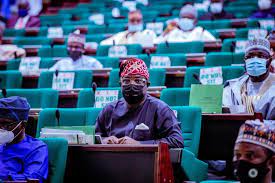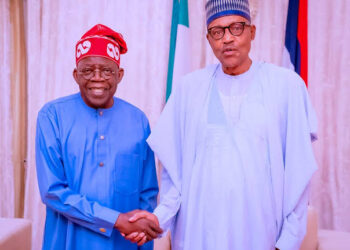 Sometime last April, the resident electoral commissioner, Kogi State, woke up from a good sleep and was confronted by the growing flood of campaign posters and billboards threatening to choke and drown the state capital, Lokoja. Something told him someone was obviously breaking the law. He rose to the challenge and promptly summoned the leaders of the political parties in the state and read them the riot act. I think he said something to the effect that unless and until INEC blows the whistle for the start of the race, no one is allowed to jump the whistle.
Sometime last April, the resident electoral commissioner, Kogi State, woke up from a good sleep and was confronted by the growing flood of campaign posters and billboards threatening to choke and drown the state capital, Lokoja. Something told him someone was obviously breaking the law. He rose to the challenge and promptly summoned the leaders of the political parties in the state and read them the riot act. I think he said something to the effect that unless and until INEC blows the whistle for the start of the race, no one is allowed to jump the whistle.
I do not know what effect his warning had on the politicians in that state, this being a country where the important people and those aspiring to become important routinely treat the law and the rule of law as inconveniences. But if the politicians in Kogi State have stopped their billboard and poster campaigns, politicians in other states and Abuja have not. Almost every street, major or minor, in the federal capital territory, spots one or two billboards of President Goodluck Jonathan’s re-election campaign. Of course, this being Nigeria, the lesser fishes may be the wrong, the big fish never. Maybe that is why INEC, headquartered in Abuja itself, appears to treat these billboards as part of the beautification project of the FCT minister, Senator Bala Mohammed.
But that is not quite right. The truth is there is a general belief that we have a law that expressly prohibits electoral campaigns before the electoral umpire decides it is right and proper to do so. Technically, there is. What passes for it is found in Section 99 (1) of the Electoral Act 2010. It says: “For the purpose of this Act, the period of campaigning in public by every political party shall commence 90 days before polling day and end 24 hours prior to the day.”
Polling day for the 2015 general elections begins sometime in February next year. If you start counting, you would find that we have more than one and half times 90 days to the day in question. It should be easy to see why the resident electoral commissioner in Kogi felt duty bound to read the riot act to the politicians itching to go on the hustings. After all, political campaigns in our country are essentially defined and limited to billboards and posters. They do all the talking for the politicians. How times change in a country hostile to change.
I have looked carefully at the provision of the Act and still wonder if it constitutes a law as such. Lawyers tell me that where a law uses the word shall, a word I suspect was borrowed from its archaic form used by Moses in writing the Decalogue, shalt, it envisages compulsory compliance. The simple interpretation of this means that our politicians and their well-paid supporters must comply with the said section of the Act. Question is, if they don’t, what happens to them?
I am not, as you should know by now, a lawyer. Still, from where I am sitting in the layman’s section of our political theatre, I feel something is not quite right with the said section. A law is usually intended to stop people from doing something. It creates an offence in clear and unambiguous terms. To show that it means business, it usually provides appropriate punishment or sanction for breaches. I can find no such threat of punishment or sanction in the said section of the said Act.
Part two, sections 117-132 of the Electoral Act lists electoral offences. Each of those sections of the act provides appropriate punishment or sanction for its breach. For instance, section 119 of the Act deals with disorderly behaviour. Its subsection (b) provides that anyone who “has in his possession an offensive weapon or missiles, commits an offence and liable on conviction to a maximum fine of N500,000.00 or imprisonment for 12 months or both.” (Emphasis mine).
That, to me, is clearly a law. It creates an offence and provides for sanction or punishment to deter those who may be inclined to breach it.
Campaigning ahead of the 90 days to an election is not listed among electoral offences in the said section of the Act. The Act has not expressly created it as an offence, either. As it stands, Section 99 of the Act, and I speak as a layman, is merely an administrative advice, not an offence. Anyone who chooses to ignore it cannot be sanctioned or punished by INEC. The riot act by the resident electoral commissioner in Kogi thus flies in the wind. Politicians are pretty good at finding and exploiting loopholes in even sieve-tight laws. A provision such as the section under discussion that is neither a law, even reinforced as it is with the almighty word, shall, nor a piece of good advice, makes for a fine picking by the politicians.
I pity INEC and its chairman, Professor Attahiru Jega. The commission and its leader are blamed for what is happening. The public tends to believe that Jega is allowing the politicians to trample the said provision of the said underfoot with, you got it, impunity. If you ask three people, at least two of them would tell you that Jega knows the president is breaching the act with his billboards and posters, not only in Abuja but also in state capitals, especially those controlled by his party, PDP, but he is not willing to call him to order.
Yet, in truth, Jega is helpless as the law, if at that, stands. It is wrong to blame him for failing to stop the president and the other politicians. The lawmakers are to blame; not Jega. Since section 99 is, in my view, an administrative advice and not law, the INEC chairman cannot enforce it as if he were enforcing a law. Thus, the law reduces him to merely advising the politicians to please wait for his whistle. This is what happens when something that looks like a law is not a law.
Having said that, let me also say that I am stoutly opposed to any law that limits political campaigns to only 90 days before an election. I regard this limitation placed on political campaigns as one of the problems of our struggling democracy. Political campaigns are not just about winning elections by individuals and political parties. They form an important part of the leadership recruitment process by the electorate. Take it away from the process, as the act tends to stipulate, and you destroy the right of the electorate to know and judge those who wish to govern them in the executive branch or represent them in the legislative branch.
I know that the generals who ruled us for so long in the recent past and redefined our politics were pretty uncomfortable with early political campaigns. They feared they would heat up the polity. Their fear, however well founded, stifled the tender democratic shoot in their hands. We should have outlived that fear by now. Party politics is like the kitchen. Heat is in its veins.
Democracy is nothing without its culture of vigour exemplified in political campaigns. Ask the Americans. Those who wish to succeed President Barack Obama in 2016 are already allowing their views and voices to be heard in the public space. Should we not be like the Americans from whom we borrowed our executive presidential system of government by allowing the people to participate in the leadership recruitment process?
I do not want section 99 of the Electoral Act 2010 to be amended to create an offence policed and enforced by INEC. I ask that it be expunged to aid the growth of our democracy.



